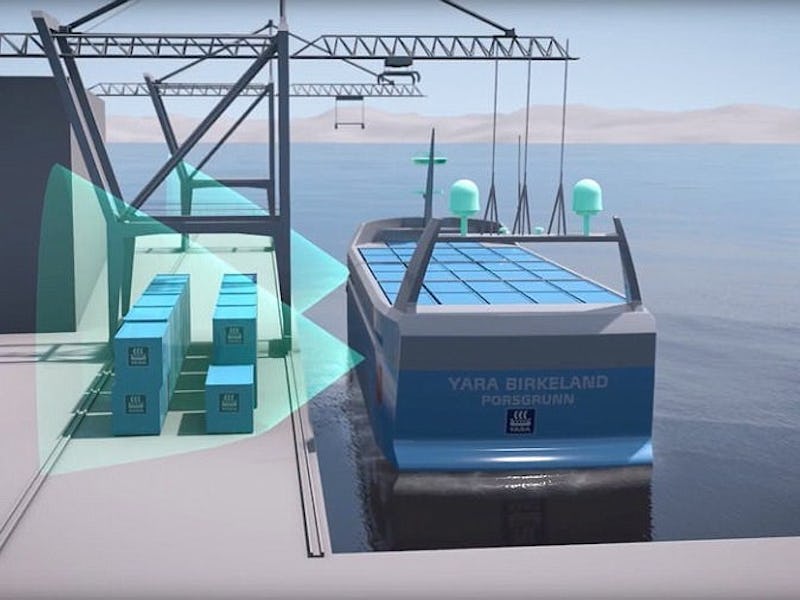While the world waits with bated breath for self-driving cars, cargo ship manufacturers are working to put autonomous vessels on the open ocean. And it could be a Norwegian fertilizer company, of all things, that gets the first uncrewed ship out there in the next few years.
Yara International, which transports fertilizer worldwide to aid in food production, plans to launch its first autonomous ship in 2018, according to a report this past weekend in Wall Street Journal announced. The captain-less vessel will also be fully electric, with zero carbon emissions.
The ship Yara Birkeland — not to be confused with Game of Thrones’s favorite Ironborn, Yara Greyjoy — would look something like this:
But the ship, which will reportedly carry 100 shipping containers, comes at a price. At $25 million to manufacture, the Yara Birkeland will be [three times costlier than a traditional vessel of similar size, according to the Wall Street Journal. Still, its manufacturer believes the costlier production will be offset down the road. Using a battery instead of fuel and advanced sensors instead of a crew is supposed to cut the ship’s operating costs by as much as 90 percent.
And that’s important to Yara’s CEO, Svein Tore Holsether. The head of a fertilizer company, Holsether might seem an odd candidate to suddenly enter into the ship-building industry or the technologically complex world of autonomous systems. But Yara, which delivers fertilizer far and wide, is no stranger to large-scale transportation — or the toll it takes on the oceans.
“As a leading global fertilizer company with a mission to feed the world and protect the planet,” Holsether said in a statement in May, “investing in this zero emission vessel to transport our crop nutrition solutions fits our strategy well.” The company estimates the new ships would decrease diesel-powered truck deliveries by 40,000 each year.
Right now, the plan will unfold like a lot of other autonomous vehicle projects. The ship should set sail with a test crew in late 2018. During this time it will train its GPS, radar, cameras, and other tools that will allow the ship to move to full autonomy. In 2019, the ship will enter an intermediary stage where it’s operated remotely, like a water-bound drone. By 2020, it should be fully autonomous.
While the ambitious deadline sets Yara far ahead of the fleet, competition is coming. In 2016, Rolls-Royce released a video with some Hollywood-level production that show its vision of a remote station monitoring hundreds of autonomous vessels around the world. In this future imagined by Rolls Royce, operators would send surveillance drones to Sweden, check holograms for diagnostics of ships in Zambia, and command the global cargo shipping system through voice recognition technology.
In an effort to make good on its plans, Rolls Royce debuted a remote-controlled ship, like the kind Yara hopes to realize by 2019. The Rolls Royce boat carried out a number of maneuvers off the shore of Copenhagen, Denmark in accordance with instructions delivered from it’s builder’s headquarters. But unlike Yara Birkeland, which will supposedly set sail in 2020, Rolls Royce estimated it wouldn’t be making fully-autonomous waves until 2035.
